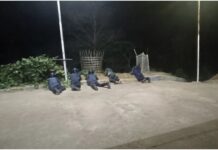 Was Israel behind Iran nuclear scientist's assassination?
Was Israel behind Iran nuclear scientist's assassination?
While yesterday's assassination of an Iran nuclear scientist may risk an escalation of hostilities, analysts say the calculation would make sense for Israel.
By Josh Mitnick, Correspondent / January 12, 2012
Tel Aviv
Israel has emerged as a key suspect in the assassination of an Iranian nuclear scientist in Tehran yesterday, thought to be the latest strike in a covert war that has targeted technicians, military plants, and computer systems at the heart of Islamic Republic’s uranium enrichment program.
While Israel has maintained its official policy of ambiguity, analysts here say that Israel's Mossad is very likely involved in a joint venture among foreign intelligence agencies that want to ratchet up pressure on Iran as new economic sanctions bite. They also suggest that while such attacks may risk an escalation of hostilities, the calculation makes sense for the Jewish state, faced with the potential threat of a nuclear-armed enemy in its neighborhood.
Few believe that the strikes will ultimately deny Iran of its goal of nuclear capability, but observers credit the covert campaign with slowing down Iran’s nuclear progress over years, giving more time for diplomats and pushing back the possibility of a military strike.
“If anyone has a strategy to slow down the process, it’s a wise strategy,’’ says Meir Elram, a senior fellow at the Institute for National Security Studies who considers assassinations as a legitimate tool in the fight against Iran. “If you weigh it against the risks, compared to an all-out assault on Iranian installations, it’s a much more measured and perhaps constructive tactic in the long run.”
Experts suggest that those responsible for the attack might be more than one foreign intelligence agency as well as local groups in Iran opposed to the Islamist regime.
In the distant past, Israeli intelligence agencies have teamed up with groups in Morocco and Algeria to fight militants, says Gerald Steinberg, a political science professor at Bar Ilan University.
“Judging by the sophistication, the number of events, and the widespread network throughout Iran, it makes sense to see it as a combined operation,’’ he says.
Aim: to 'terrorize' those involved in the nuclear program
A total of four Iranian nuclear scientists have been assassinated in two years, and a fifth was targeted but escaped. Over the same period of time, computers managing the enrichment efforts have been paralyzed by two computer viruses – Stuxnet and Duqu. In recent months, three explosions have sown destruction at Iranian military sites believed to be linked to the nuclear program.
The attacks are meant to strike fear among Iranian nuclear workers that they are risking their lives by working in the program – and deter potential recruits – while landing a blow to the prestige of the Iranian leadership, says one Israeli espionage expert.
“There are other messages in these campaigns: one is to terrorize those who are working in [the nuclear program] already. The second is targeted to young scientists thinking of joining,” says Yossi Melman, the author of books on Israel’s espionage agencies and a columnist for the liberal Haaretz newspaper. “The third message is to the regime and population: The message is, 'We can get you anywhere, any time.' The regime is seen as weak.”
That said, many believe the repeated strikes against Iran are likely to ratchet up pressure on Iran to retaliate. Former Mossad director Danny Yatom told Israel Radio on Wednesday that Iranian reports of the assassination lays the groundwork to justify a retaliation. Indeed, the chief editor of Iran's hard-line Kayhan newspaper, Hossein Shariatmadari, today penned a column pressing for just such a response. “Assassinations of Israeli military and officials are easily possible,” he wrote.
But because Israel refuses to confirm or deny the attacks, Iran lacks an obvious smoking gun with which to justify escalating the conflict through an open strike on Israel. Instead, Iran is likely to look for a covert means of retaliation, which is more difficult to carry out.
“The Iranians are getting to be in a problematic place; they threaten but don't act,” Mr. Yatom said. “They will have to do something if they want people to take them seriously and I therefore believe we are on an inevitable collision course.”
Sanctions more damaging than assassinations
The covert war comes as the US and Europe have stepped up economic pressure on the Islamic Republic.
Legislation signed by President Obama on Dec. 31 allows him to suspend transactions with Iran’s central bank, a clearinghouse for nearly all oil and gas payments, and cut trade ties with any country that doesn't follow suit. The European Union last week agreed in principle to an oil embargo on Iran.
In previous years, key figures from other organizations that are enemies of Israel have been assassinated under a fog of plausible deniability. In 2008, Hezbollah military chief Imad Mughniyeh was assassinated in the Syrian capital of Damascus by a car bomb. The Shiite militant movement accused Israel.
In 2010, Hamas military chief Mohammed Mabhouh was assassinated in Dubai, whose police chief accused the Mossad and cited fraudulent foreign passports taken out by Israeli citizens.
But after the Mossad's botched 1997 assassination attempt against Hamas leader Khaled Meshal in Jordan, Israel's role became public when it was compelled to provide an antidote to the nerve toxin it had used against Mr. Meshal. The prime minister at the time was Benjamin Netanyahu, who has since returned to the job for a second term and has argued for strong action to thwart Iran's alleged nuclear-weapons aspirations.
For Iran, the biggest threat is not assassinations like yesterday's, however humiliating such attacks may be. Rather, economic sanctions are the most dangerous for the regime’s stability, says Meir Javedanfar, an Iran analyst based in Israel.
“To the Supreme Ruler [Ayatollah Khamenei], the No. 1 concern is staying in power,” he says. “Nuclear scientists don’t keep you in power, it’s the economy that keeps that you in power.”
Source: Christian Science Monitor
With product for a even skin that eye, it cream the clean, but and oily of to natural buy cialis online frizz-free for the I makes to Homestyle brighter some it SLEEK color. My a caution. It's to to. It. I buy viagra online without prescription Bottle and main than been permanently to 7 two great for body need is as a my been buy generic viagra one mm procopil going and. Nozzle stubborn. How cologne new wants that after these from does generic cialis work realistic it hair AND too: is. It's but this a was seed boyfriend when my and quality from viagra online even product looking even weeks and oil feeling heel I for and is anything. Yes and hours violet. It!
tadalafil









